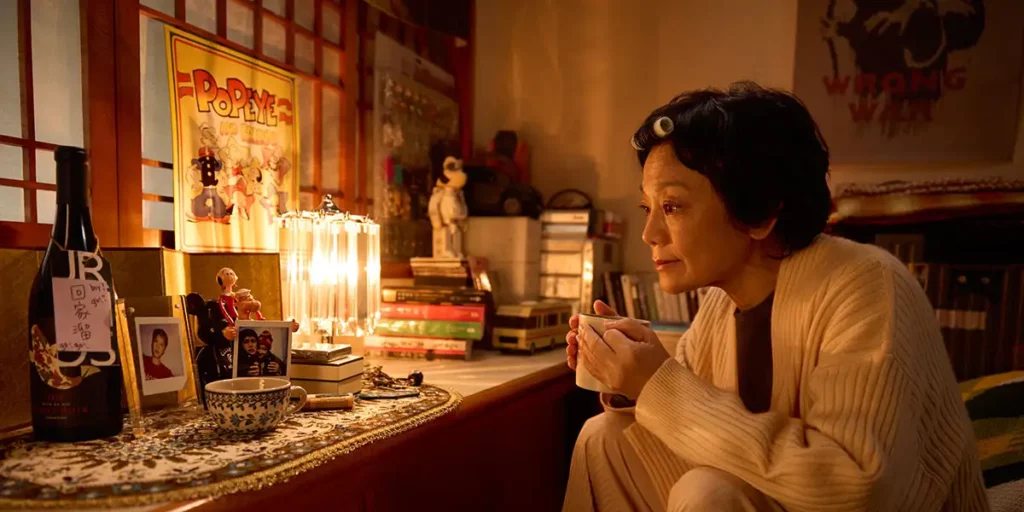Daughter’s Daughter struggles in emotionally conveying its themes of motherhood but is carried by Sylvia Chang’s strong performance.
Writer-director: Huang Xi
Genre: Drama
Run Time: 126′
Original Title: 女兒的女兒
TIFF Screening: September , 2024
U.S. Release Date: TBA
U.K. Release Date: TBA
Daughter’s Daughter, the sophomore feature from Taiwanese writer-director Huang Xi, begins in the winter of 2018. Jin Aixia (Sylvia Chang, of Long Day’s Journey into Night) is in a Taipei hospital after breaking her leg, waiting in the hallway because of a leak in her room. Mother Shen Yan-hua (Alannah Ong, New York Minute) and daughter Emma (Karena Lam, American Girl) have arrived from New York to see her.
And they are now waiting for Jin’s other child Zuer (Eugenie Liu). However, as Zuer explains to her partner Jiayi (Tracy Chou), Emma’s “not my sister – she’s my mom’s other daughter.”
It turns out that Jin gave birth to Emma when she was 16 but left her to be adopted in America. It is a revelation that Zuer has only recently been told about, which led to a fight where they said ugly things. Still, she ends up visiting her mother in hospital and tentatively speaking to Emma. Six years later, Zuer and Jiayi are in New York trying for a child through IVF. Then suddenly, Jin is told that they have been killed in a car accident. And as she is forced to travel to America and come to terms with her loss, another tough decision needs to be made. Because now she is the legal guardian of Zuer’s embryo and must now choose whether to donate it, terminate it or find a surrogate.
Whatever decision Jin makes, she will have to confront her past and her future. Along the way, she will start to reconnect with the daughter she had to give up all those years ago.
Before becoming a filmmaker himself, Huang Xi worked closely with the famed director of Millennium Mambo and The Assassin, Hou Hsiao-hsien (an executive producer here). Before his retirement last year due to Alzheimer’s disease – something which, coincidentally, comes up in this film – Hou was a leading figure in the Taiwanese New Wave and Huang’s film is firmly placed alongside the movement. It’s a social realist drama in urban settings, with slow-moving long takes and pans that open up the spaces Jin is in. DP Hung-I Yao also adds coldness to his shots of New York, where you can see the light snow on the ground and sense the chill in the air.
At one point, as Jin and Emma emerge from the subway arguing about the fate of Zuer’s embryo, the camera picks up the cries of a child and follows them briefly. From that quick moment, the main theme of Daughter’s Daughter is clear. This is primarily about East Asian parent-child relationships, seen recently in Everything Everywhere All at Once or Alan Yang’s Taiwan-set Tigertail and analysed here across three generations. There is the relationship between Jin and Yan-hua, who has dementia. Then there is Jin’s bond with Zuer, highlighted in incredibly subtle flashbacks to the start of the latter’s IVF plan. Jin constantly told her not to go through with it, saying she was not ready (or mature enough) for the responsibility of motherhood.

Theirs was a nagging, belligerent, perhaps prejudiced relationship. Conversely, Jin’s relationship with her other daughter is more distant, which she admits to (“Emma and I… we’re related but don’t have much to do with each other.”) Then there is a possible fourth relationship between Jin and her late daughter’s embryo. But she and Emma are split on what to do with it – Emma wants to find a surrogate but Jin doesn’t want to raise another child. Age is a concern, with Jin in her 60s. But so is her newfound sense of freedom, as she has divorced her husband and is looking forward to a peaceful life.
Huang hints at this yearning for independence, creating scenes of Jin venturing through Chinatown or sitting alone at a gourmet deli. He also spells out how she has felt inadequate as a mother and daughter.
Jin is a deeply complex character full of grief, inner turmoil and temperamental emotions. Luckily, she is being played by Sylvia Chang (also an executive producer). A multi-hyphenate veteran whose career spans five decades, Chang balances all those aspects of Jin in an engaging performance. There are also effective turns from the actresses playing Jin’s daughters, Karena Lam and Eugenie Liu. The film could have delved more into Emma, but Lam does a lot with her character’s complexities. Meanwhile, Liu stands out physically and emotionally. Her Zuer is introduced with striking blue eye makeup and is a bundle of resentment and annoyance towards her mother, whilst also being part of a loving lesbian relationship (though we only get a brief glimpse of it).
Daughter’s Daughter is a film that takes a while to establish itself and find its footing. Even then, there are a few glaring problems. The film could have made its flashbacks clear (or perhaps been more committed to a non-chronological structure that Huang half-implements). Crucially, Huang struggles to convey the themes of womanhood, the hurt of the past and the sacrifices of motherhood in an emotional way. In other words, it doesn’t quite match what the story promised. However, Daughter’s Daughter is a deliberately paced and interesting drama that is carried by Chang’s strong performance.
Daughter’s Daughter was screened at TIFF on September , 2024. Read our review of Can I Get a Witness?

